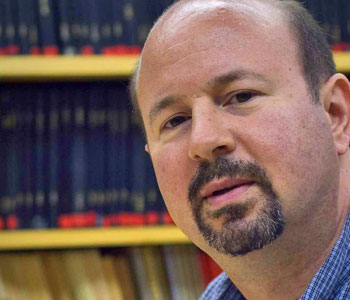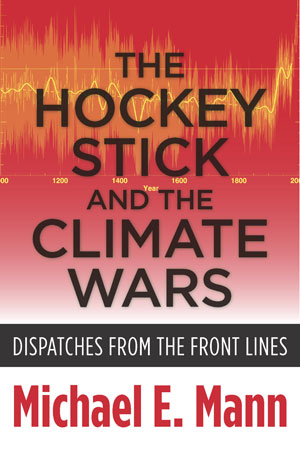
This book tells my personal story, that is, the story of a young scientist, driven by a curiosity about the natural world, who found himself wandering, essentially by accident, into one the fiercest public debates in the history of science and society. That debate is the raging and often rancorous tussle over the reality and implications of human-caused climate change.
I provide a firsthand account of what I refer to as the “climate wars.”
The climate wars are being fought on science by vested interests opposed to any efforts to regulate our ever-increasing emissions of greenhouse gases into the atmosphere. These emissions are warming the planet and changing our climate. If unchecked, they could have disastrous consequences for human civilization and our planet.
Back in the late 1990s, my co-authors and I published a graph that depicted the trend in temperature of the past thousand years. The graph demonstrated that the spike in global temperatures of the past century was without precedent for at least the past 1,000 years. It became known as the “hockey stick” for its shape—a long-term decline from relatively warm conditions during Medieval time to the colder conditions of the Little Ice Age (think of this as the “handle”), followed by the unprecedented and abrupt warming of the past century (the “blade”).
By publishing this graph—which quickly became an icon in the debate over global warming—my co-authors and I found ourselves directly in the sights of an industry-funded effort to discredit the science supporting a human impact on our climate.
Although I was initially a reluctant combatant in these battles, as I explain in the book, battle scars have hardened me and have led me to embrace the role I now find myself in—an advocate for insuring that the choices we make today, which have a bearing on the futures of our children and grandchildren, are informed by objective and accurate science—science which indicates that the ongoing, unchecked burning of fossil fuels represents a threat to the future of human civilization.
There are other excellent accounts of the science and politics of global warming. But no other provides such a front line view of the scientific battle behind efforts to save our planet from the perils of climate change.
Readers familiar with some of the great debates in the history of science may appreciate the book’s attempt to place the modern debate over human-caused climate change in the broader context of past battles that have erupted when science and politics have collided.
Readers might appreciate, for example, the remarkable parallels that oddly enough exist between the fallacious statistical arguments that lay at the center of early-20th-century arguments for a racial basis of intelligence (as detailed so masterfully in The Mismeasure of Man by the late Stephen Jay Gould) and the arguments that were used by our own detractors in an effort to discredit the “hockey stick” reconstruction of past temperatures.
The book uses the science of climate change as a vehicle for exploring larger issues at the center of science and society. For example, how we distinguish true skepticism, that is not only good but essential in science and lies at the core of the self-correcting machinery that drives science toward an increasingly better understanding of our world—and agenda-driven contrarianism or denial, approaches that have no place in honest and legitimate scientific discourse.
Readers interested simply in a better understanding of the science of climate change, a debunking of the myths that abound in popular discussions of the topic, and an assessment of the actual controversies and uncertainties in the underlying science, will find, in this book, a discussion that is both accessible and yet does not insult their intelligence.
Historians of science familiar with past lessons over the dangers of the politicization of science will find in this book a cautionary modern lesson which exposes in sometimes dramatic and disturbing ways the dangers that arise when the findings of science collide with the agenda of powerful vested interests.
For those who are simply interested in how the professional path of a young scientist could lead him unintentionally into the center of the fierce and often rancorous debate over climate change, I take them on my own journey. That is the journey from a young child fascinated about how the world works to a climate scientist forced to do battle against agenda-driven politicians and industry-funded special interests who have sought not only to discredit him and his science, but to threaten his livelihood and safety.
In the beginning of the prologue I draw upon a specific recent event: the theft of thousands of scientists’ emails, including many of mine. This is the world in which I and many of my climate scientist colleagues now find ourselves.
I attempt to provide the reader with a sense of what it is like to be forced to battle against powerful vested interests looking to discredit scientific findings, question one’s integrity, and make an example for those whose research might challenge the safety of our current societal addiction to fossil fuel energy.
Moving on, I then provide a bit more historical context to help readers understand how it is that we got to this point, drawing once again on an event from earlier in my career. I explain the tactics developed in recent decades—what I call the “Serengeti Strategy”—that have been used to try to isolate individual scientists, malign and discredit them, and make an example of them for others. They are all a cynical attempt to undermine scientific findings that their detractors perceive to pose a threat to them or to those they represent.
In short, it is here at the very beginning of the book where I attempt to give the reader a sense of how it could be that a scientist like myself, driven by curiosity and following the scientific evidence wherever it leads, now finds himself at the center of what may be the greatest assault on science in modern history.
I would hope that readers, upon finishing my book, would be in a position to appreciate and understand the chain of events and experiences that have led to my evolution over time in how I view my role as a scientist.
A one-time adherent to the view that a scientist’s role ends at the lab room door and the publication of findings, I have over the course of my career increasingly been led to conclude that a scientist’s role potentially goes far beyond that.
In part due to the attacks against me and my colleagues by those looking to discredit the linkage between the burning of fossil fuels and the dangerous changes now taking place in our climate, I am led to believe that the scientific community cannot stand idly by while those with an agenda look to attack and misrepresent scientific findings and pollute the public discourse.
In areas where science and policy intersect, be it global warming, biomedical research, environmental pollution, evolution, or any number of other modern hot-button issues, scientific findings have deep implications for public policy.
Our media have becoming increasingly ill-equipped to cover these issues accurately and objectively. This is due in part to the recent layoffs of the journalists on the science and environmental beat who are able to distinguish antiscientific propaganda from legitimate scientific discussions. Those with an agenda are more than willing to fill the void that has thus been created in the public discourse.
If scientists themselves are not willing to step in and help insure that discussions of policy are informed by an accurate, objective, and honest assessment of what the science has to offer, then there is little hope that we will act in time to avoid dangerous impacts on our climate—impacts that will mortgage the quality of life for future generations.
If nothing else, I hope readers will understand this predicament after reading my book. And perhaps my story will inspire them to do more themselves to work toward a solution to this monumental challenge we face as a society.


Michael E. Mann is Professor of Meteorology at Penn State University and Director of the Penn State Earth System Science Center. Besides The Hockey Stick and the Climate Wars, featured on Rorotoko, he is the author of Dire Predictions and of over 150 peer-reviewed publications. In 2007 Dr. Mann shared the Nobel Peace Prize with the other members of the Intergovernmental Panel on Climate Change. He has been named among the fifty leading science visionaries by Scientific American, inducted as a Fellow of the American Geophysical Union, and awarded the Hans Oeschger Medal of the European Geosciences Union. Dr. Mann is co-founder of RealClimate.org.